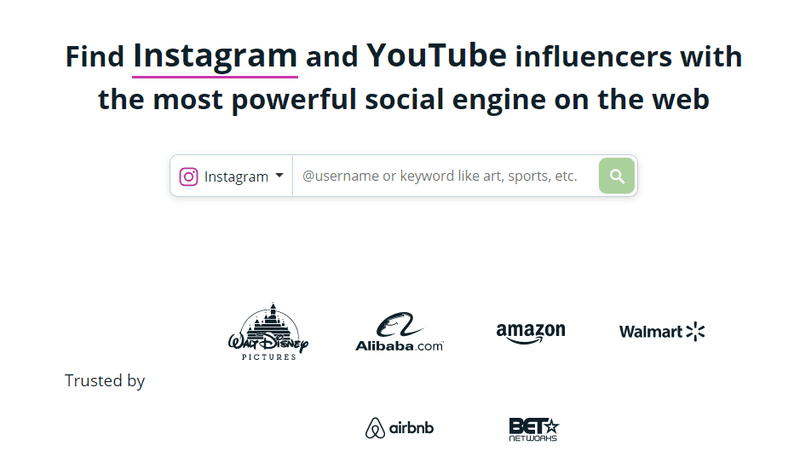How to Work with YouTube Influencers in 2025
Here's the complete guide to working with Youtube influencers. Types of videos to test, how to set up your first YouTube influencer campaign and much more.
Published November 5, 2024.

When was the last time you watched a YouTube ad from beginning to end? A decade ago right? And what was the last time you watched a video from your favorite influencer and looked up the product they mentioned?
Exactly.
The number one mistake brands do on YouTube is that they launch advertising campaigns instead of working with influencers. Influencers have loyal online communities that they've built through publishing engaging content. When you work with an influencer you gain exclusive access to that community.
And the best part is that YouTube videos live on forever, way after your paid ads budget has run out.
Hi, I'm Geoff Cudd, a marketing agency owner, and I'm here to share my experience with YouTube influencer campaigns. I'll give you a quick overview of how they work, and provide some killer examples that you can draw inspiration from.
Let's dive in.
Why use influencer marketing?
Why 93% of marketers use influencer marketing can be boiled down to three main reasons: it’s cheap, it’s effective, and it’s a sure way to get your product in front of your target audience.
For starters, 61% of people trust influencers' recommendations. When done correctly, you’ll have someone highly relevant to your niche recommending your product to a loyal fanbase that’s already interested.
Second, influencers have become one-person production teams, understanding the basics of video production, editing, and social media strategy. This expertise, when combined with a low cost-per-view, results in a CPM that's half the price of paid advertising.
The conversion rate of these cost-effective, targeted advertisements and shoutouts is the most impressive part of it all. Brands can earn an average of $5.78 for every dollar spent on influencer marketing.
Why use YouTube for influencer marketing?
The reason to use YouTube over other social media platforms like Facebook is, ultimately, YouTube ads are more effective.
The benefits that I’ve seen from YouTube influencer marketing specifically include:
Higher conversion rate – Warm referrals to your website from trusted influencers convert significantly higher than cold organic traffic from search engines, social channels, or PPC campaigns.
Cheaper than ads – Most YouTubers will work with you at affordable prices. For example, micro-influencers usually charge $500 to $1,500 for a sponsored video.
Easy outreach – Many YouTubers are rarely approached and are much more likely to respond to cold outreach than a typical blogger. Plus, since they are used to talking on camera, they’re generally easier to get on a phone call.
Ongoing traffic – Unlike paid ads, videos will continue to generate traffic over time. It would be difficult for YouTubers to edit a video and remove your sponsorship even if they would want to.
Meet people in your niche – I’ve personally made lasting connections with the YouTubers I’ve met through this process. This is a great way to connect with people in your niche. I've made industry friends and advisors, hired writers and subject matter experts for press inquiries, and I even hired on YouTuber to produce videos for my own YouTube channel.
Pro tip: want to work with the right YouTube influencers? Hire an expert YouTube channel manager today!
How does YouTube influencer marketing work?
YouTube influencer marketing involves a company establishing a private deal with YouTubers to promote their product or brand within their videos.
In the case of YouTube influencer marketing, companies make a direct connection with a YouTuber either using a marketing agency or reaching out personally rather than using something like YouTube ads.
YouTube influencers then find a creative and unique way to use or feature the company’s product or service. They often provide an affiliate link, a custom landing page URL, or a special promo code for followers to check out the product for themselves.
These sponsorships can cost a fraction of paid ads and for me, they convert 9.6 times the rate of my organic search traffic.
YouTube influencer traffic converts 10X higher than organic traffic
I run a marketing blog called Don’t Do It Yourself and wanted to try working with a few YouTube influencers. I reached out to a list of influencers to promote my website in a personalized ad where the YouTuber would mention my brand in their own words with a link to my website in the video description.
I had hoped that a warm endorsement from a trusted brand would result in more conversions but the results surprised me. I not only got a flood of traffic, but that traffic also converted 10x higher than my organic traffic, averaging an impressive 6.62% conversion rate. Launching YouTube sponsorships really paid off.
Want to replicate my success? You should first decide on the type of influencer campaign you want to launch.
Types of YouTube influencer marketing videos
The main three ways that YouTube influencer videos can work are:
Product Placement: The YouTuber uses your product somewhere in their video in an obvious way. this type is popular with lifestyle influencers but doesn't work as well as the next two types of promotions.
Sponsored Mentions: The YouTuber describes your product in a 30-90 second advertorial using their own words during one of their videos (my preferred method). It's like a short product endorsement usually done in the beginning or in the middle of a video.
Dedicated Video: The YouTuber produces an entire, dedicated infomercial-style video for your product. So instead of simply mentioning your product in the video, they make the entire video about your product.
Having those three types of promotions in mind, here are all the various popular types of videos that YouTube influencers create for brands.
1. Unboxing videos
YouTube influencers often do an “unboxing” video for products where they review their first impression of the item.
This is a good option because it builds a level of excitement and anticipation for the item and allows the viewers to share the moment with the influencer. It also helps the online audience view the product from different angles and learn about its features.
2. Tutorials
Tutorials are great because they’re both great advertising and informative. Simply put, the YouTuber explains to viewers how to use a product correctly. These are great for potential leads as well as active users of the product. That’s many of the type of videos you find on the pages of Amazon influencers or in Amazon reviews.
3. Vlogs or day-in-the-life videos
In day-in-the-life vlogs, influencers take viewers along with them through their daily routines.
During one of these videos, an influencer could use your product and give your company a shoutout.
This is a great option because it fits seamlessly in with the influencer’s typical content, and helps promote the product in an organic way.
Here’s an example from a popular beauty influencer.
4. Hauls
Hauls are similar to unboxing videos but are a good way to have the influencer feature multiple items from your store. Here’s a great example of a haul from a gaming influencer:
5. Product reviews
Product reviews are similar to unboxing videos where the influencer covers the benefits and drawbacks of a product.
It’s good for influencers to be honest with their audience because it gives their opinion more credibility, making viewers more likely to purchase your product or service.
6. Contests or giveaways
This type of influencer video not only gets your product directly into the customer’s hand but also makes it a prize. In contests and giveaways, viewers “compete” in a way to win the product. Here’s a giveaway video where MrBeast is giving way cars to people he meets. Don’t try this at home 😅
7. Comedy sketches
Comedy sketches are a fun way to feature your product.
Humor always makes folks more open to new ideas, and if your influencer is already creating comedic content, they’ll write a good script that casts your product in a positive light in a clever way.
Tips for a successful YouTube influencer marketing campaign
1. Set clear goals
The first step is to come up with a good marketing strategy and set clear goals. This means choosing the KPIs that you want to focus on, the specific social media channels that you want to use, and the audience of potential customers that you want to target.
For example, your chosen KPI could be the number of clicks, video impressions, and, in the case of eCommerce sites, how many times the unique discount code has been used.
2. Set a budget
Now it's time to set your budget. If you think you’ll get a YouTuber to namedrop your business for free… we’re sorry to break it to you, but they won’t.
Depending on the size of the influencer’s audience, expect to pay $500-$10,000 per video for average influencers and upwards of $20,000 for celebrity influencers.
3. Find YouTube influencers
Determine which of the four types of influencers (nano, micro, macro, and celebrity) you have the budget for and which will help you reach your goals.
You can find YouTube influencers using an influencer marketing agency or research and reach out to some on your own. You can also use influencer tools like Grin or Klear to find influencers based on engagement rates, industry, and niche audiences.
Pro tip: the most important metric to look at when you're looking for influencers is their engagement rate. You don't want to only go by the size of their audience because they could have fake followers. An influencer with an engaged audience is always more valuable to your brand than mega influencers with millions of followers and no engagement.
4. Agree on the terms and scope
Now it's time to reach out to all the people on your list and agree on the terms and scope of the influencer partnership. Discuss the type of content you want them to make, how you’re going to measure performance, and how much creative license they have.
Then, negotiate a deal on the exact terms and scope of the agreement. When you’re both happy with the deal, sign the paperwork and start the project.
Pro tip: you should look for popular channels reviewing your competitors' products and see the type of campaigns they run, the type of scenes, content, and creative control they give to their influencers.
5. Ask for revisions / QA
If you watch their first video featuring your product and you don’t like the way they do it, let them know. Clarify what you were envisioning and what they put in the script or video that you weren’t digging and check out their new version.
You should always look through the entire video. There are many things to look out for including:
- Did they use the right CTA in the video?
- Is the correct coupon code displayed?
- Did they put the right info and links in the description?
- Did they discuss the benefits of your product?
- Do they sound excited or happy? how is their tone of voice?
If you give your influencer a link to display it's important to test it and make sure the sales funnel or marketing funnel works properly.
6. Measure the performance
The cardinal rule in marketing is that you should analyze every marketing campaign, otherwise you're shooting in the dark. Use the KPIs you've set up to evaluate the results and make adjustments as necessary.
You should also conduct regular video audits to ensure that your product is still being promoted in the way that you have agreed upon.
Pro tip: promote the influencer's video to your email list. You can either link out or embed the video in an email.
7. Optimize for the next campaign
Things might take a while to work out in the beginning, but you will learn from your mistakes. If your campaign didn't perform as expected, ask yourself the following questions:
- Did you set expectations clearly enough?
- Was the influencer content good enough?
- Did you pick a strong enough CTA?
- Was the offer enticing enough?
- Or did you just work with the wrong influencer?
Use these findings to inform your next YouTube influencer campaign.
Pro tip: Want to get started on the right foot? Check out our influencer marketing checklist.
Find the best YouTube influencer expert
Struggling to find the best influencers to work with? Don’t have the internal resources to set up your influencer campaign? Come find the best influencer marketing expert on Mayple.
FAQs
Should you use YouTube influencer marketing?
YouTube is the second most popular platform for influencer marketing. It's also the largest video platform on the web, with over 1.9 billion monthly users. YouTube influencer marketing is a successful, inexpensive way to see a high return on investment.
How do you pick the right YouTube influencer?
To pick the right YouTube influencer, consider your budget, needs, and the type of influencer you want. When you're doing your research you can search for hashtags like "sponsored" and "ad" + your niche to find influencers that have worked with similar brands in the past.
If you're using influencer marketing software you should search for influencers whose audience demographics match your target audience, that have done similar types of campaigns to what you're looking for and are in the same niche.
How to get started with YouTube influencer marketing
Here's a step-by-step guide on how to set up your YouTube influencer campaign.
- Make a list of YouTubers that you want to reach out to.
- Send an email to your list to set up a call.
- On the call, discuss how you see the sponsorship working.
- Negotiate a deal.
- Track performance.
- Perform a regular video audit to ensure your product is being promoted in the way you agreed upon.
- Optimize for the next campaign
How much should I pay a YouTube influencer?
Some YouTubers charge based on video views ($50-$100 per 1,000 views). Others charge based on the type of campaign you want to run. A product mention is usually cheaper and can cost as low as $500. A dedicated (or sponsored) video could be anywhere from $1,000 to $20,000.





